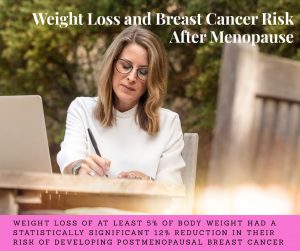Weight Loss and Breast Cancer Risk After Menopause
Hello. This is Dr JoAnn Manson, professor of medicine at Harvard Medical School and Brigham and Women’s Hospital in Boston, Massachusetts. I’d like to talk with you about a recent report in the journal Cancer,[1] on the relationship between weight loss and risk for postmenopausal breast cancer.
We know from several studies that obesity is a risk factor for developing breast cancer after menopause.[2] But few studies have looked at whether weight loss can reduce this risk. It takes a very large study and long-term longitudinal follow-up. We know from other research that weight loss is linked to lower blood levels of estrogen and inflammatory biomarkers and improvement in insulin resistance, all of which should have favorable influence on the risk of developing postmenopausal breast cancer.[3] The large-scale Women’s Health Initiative provided an opportunity to look at these relationships. I’d like to acknowledge that I’m a coauthor of this report.
In the Women’s Health Initiative, among more than 61,000 women in the observational cohort, the women came in for clinic visits and had their body weight measured at baseline and again at 3 years. We were able to categorize these women as having stable weight (< 5% change in body weight during those 3 years), having weight loss (they lost > 5% of starting weight) or weight gain > 5%. We followed these women for an average of 11 years for their incidence of postmenopausal breast cancer.
We found that the women who had weight loss of at least 5% of body weight had a statistically significant 12% reduction in their risk of developing postmenopausal breast cancer compared with the women with stable weight. The women who had weight gain did not have an overall increase in breast cancer risk but they did have a significant increase in the risk for triple-negative breast cancer. We think these findings should be interpreted with caution because we looked at a number of different subtypes of cancer.
Overall, these findings provide evidence that even a modest weight loss is linked to a reduction in the risk of developing postmenopausal breast cancer. In the Women’s Health Initiative, an earlier study suggested that this amount of weight loss was also linked to a reduced risk of developing endometrial cancer.
In terms of guidance for patients, it’s certainly important to encourage healthy lifestyle practices to achieve weight loss, such as regular physical activity, a healthy and sustainable dietary change, and avoiding excessive alcohol intake. This is a much better way of achieving sustainable weight loss than any dramatic calorie restriction that can’t be sustained, smoking to have a lower body weight, or taking over-the-counter weight loss supplements.
This is good news—that even a modest weight loss may reduce the risk of developing postmenopausal breast cancer. Thank you for your attention. This is JoAnn Manson.
At Botanica Medica our Naturopaths are well aware of the importance of having a good healthy weight and the effect it can have on your life both physically and mentally. They come across lots of interesting studies like this one. If you would like to make an appointment with one of our Naturopaths to help you lose some weight call Botanica Medica on 8271-1827 today. They are only to happy to share the knowledge they have gained through their studies and patient outcomes, and get you feeling better. Botanica Medica is located at 97 Glen Osmond Road, Eastwood and appointments are available Monday to Saturday including some after hours.
References
Perspective > Medscape Ob/Gyn > Manson on Women’s Health
COMMENTARY
JoAnn E. Manson, MD, DrPH
DISCLOSURES
October 25, 2018
Artwork created in Canva


Recent Comments